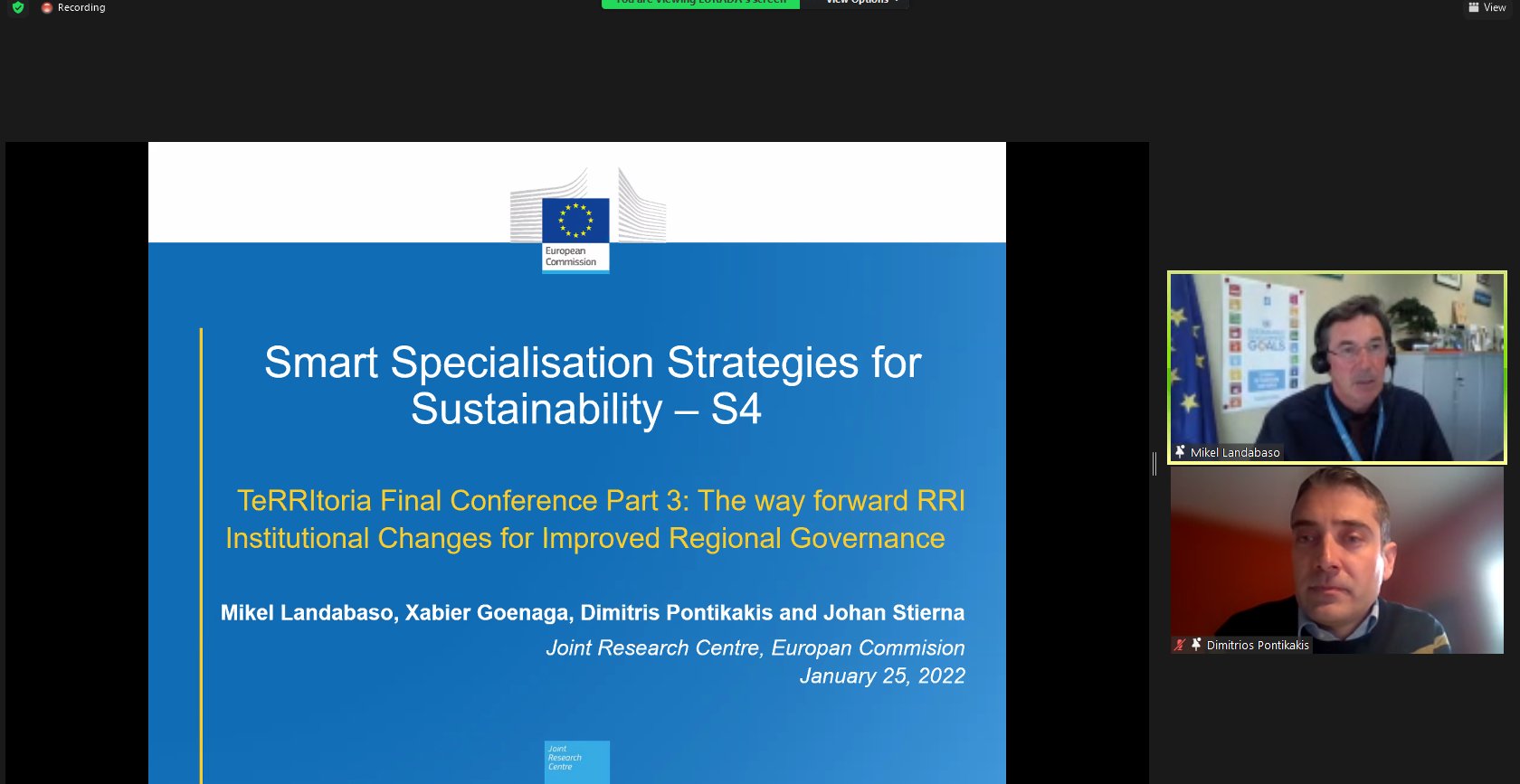TeRRItoria final conference marks a successful end as it explores RRI for improved regional governance
The final conference of the TeRRItoria project took place virtually from January 18th-25th, 2022 and explored the theme of Regional Research and Innovation (RRI) Institutional Changes for Improved Regional Governance. This conference is the culmination of the experiences had, lessons learned, and knowledge gained over the past three years of the TeRRItoria project. The three thematic sessions provided the opportunity to hear from experts in their respective fields, representatives from the pilot projects, and stakeholders with first-hand experiences in Responsible Research and Innovation (RRI) and regional governance.
More than 100 people joined the opening session of the conference featuring the theme of How to engage citizens in regional development policiestook place on January 18th. Throughout the session, the need to involve and engage citizens for innovation, as they are the end users benefiting from policies was heavily emphasized, and ensuring that citizen engagement is done in a meaningful way was deemed essential.
Some of the approaches discussed on how to better conduct meaningful citizen engagement include:
- Engage with both individuals and civil society organizations (CSOs), as they bring different knowledge and ideas to the table;
- Host citizen engagement and consultations throughout the process;
- Provide open opportunities for all members of society to participate in consultations;
- Co-creation using the quadruple helix leads to more representative and engaging ideas from citizens and other stakeholders.
The use of RRI was also discussed as a tool that can be deployed to increase transparency and success, and in the social empowerment of citizens to innovate new solutions. RRI can also add value in terms of how we design policies and with whose interests we choose to align them. Engaging with citizens at the regional policy-making level entails numerous benefits, including connecting with and strengthening bonds between Civil Society Organisations (CSOs) and citizens with democratic institutions, as well as facilitating the necessary resources to foster spaces for innovative ideas from stakeholders with territorial knowledge to flourish.
(Click here to read the full article about the first session of the TeRRItoria final conference)
The second session of the TeRRItoria final conference was held on January 22nd on the topic of Institutional Changes for Responsible Research and Innovation was attended by 78 participants. Policy recommendations emerging from the TeRRItoria project were presented relating to the design, implementation, and monitoring and evaluation phases of a project, in addition to a series of suggestions, including on how to enhance sustainability.
Panellists shared their experiences and successes of using challenge-based approaches, facilitating consultations and collaboration through a Regional Open Innovation Platform (ROIP) and the benefits of organisational mapping in response to some of the recommendations presented related to the design stage. In the implementation phase, experiences on how enhanced anticipation was achieved through foresight exercises, and the manner in which inclusiveness was promoted through the inclusions of equality principles in Research and Innovation Strategies for Smart Specialisation (RIS3) were shared, while we learned from pilot projects how reflexivity is important and responsiveness including the ability to adapt and re-adjust is especially important at the regional level.
RRI can lend itself to transformative change at the territorial level and help with the response to emerging, global challenges. It is important to contemplate, however, that regional size does matter, and differences and circumstances between rural and urban areas, and between one region and another are prevalent, therefore strategies must address and respond to these differences to be effective.
(Click here to read the full article about the second session of the TeRRItoria final conference)
The third session of the final conference took place on January 25th, and featured discussions, experiences shared and ideas presented on The Way Forwardfor Smart Specialisation Strategies at the regional level. Since the future of S3 is a predominant topic in the everyday life of the regional practitioners, 113 people joined this online event. Much of this session looked at the shortcomings, successes, and lessons learned from Smart Specialisation Strategies (S3) as well as how those lend themselves to the transition towards and development of Smart Specialisation Strategies for Sustainability (S4).
Some of the challenges facing S3 that were highlighted as needing to be responded to for S4 are:
- Enhanced focus on needs and suitable solutions for rural areas and less prosperous cities;
- Lack of directionality;
- Absence of mission-oriented approaches;
- Fragmentation of vertical and horizontal efforts for both funding and governance;
- Shift away from smart growth as a standalone notion towards growth that is smart for sustainability, and growth that is smart for inclusivity.
In this webinar, it was discussed how the need for S4 emerged in large part to the European Green Deal, and presents an opportunity to retool our economies to better use resources to generate co-benefits for the economy, society, and environment. Multiple speakers expressed the need for S4 to not only add sustainability to S3, but also expand and improve on it, which can be done with an increased focus on resilience as well as the adoption of tools such as RRI.
A playbook is in development by the Joint Research Centre incorporating the knowledge and lessons that emerged from RIS3, while incorporating new methodologies for S4. This will serve as a set of tools and building blocks that can be used by territorial actors to develop a strategy using S4, and is expected to be published in mid-May 2022.
(Click here to read the full article about the third session of the TeRRItoria final conference)
In conclusion, this final conference of the TeRRItoria project served as a summary of the work and ideas that have emerged from the project over the past three years. The need for inclusive regional development that leaves no one behind, and that meaningfully engages citizens and CSOs throughout the process were frequent points of discussion throughout the conference. Looking towards the future and the transition from S3 to S4 provides a critical opportunity to apply the knowledge and lessons learned from this project to ensure future actions are rooted in resilience, sustainability, inclusivity, and meaningful citizen engagement, using tools such as RRI, bottom-up approaches, and co-creation.
Thank you to everyone who participated in and attended the conference, as well as all of those who contributed to the success of the TeRRItoria project over the years.





